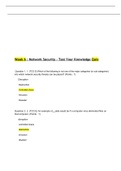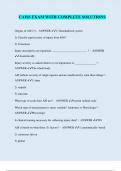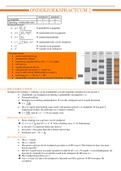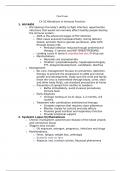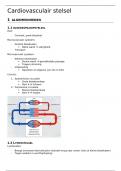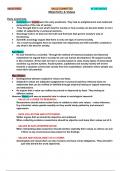Learning Aim A, B, C
CPLD, Level 2, Unit 4
Exam unit- Promoting Children’s positive behaviour
Why Children’s behaviour may be affected by certain
factors
Behaviour is not something that is fixed. Like adults, children have moments when
they find it hard to control their emotions or to wait to have their needs met. In this
section we look at the many negative factors that can influence children’s behaviour,
both positively and negatively.
Theories that support our understanding of children’s behaviour
There are several theories that adults in early years settings use to understand how to
promote children’s behaviour. In this section we look at the many factors that can
influence children’s behaviour, both positively and negatively.
Maslow’s hierarchy of needs
Abraham Maslow devised a theory to explain why humans are motivated to do things.
He recognised that people have certain needs that must be met. He also suggested
that the needs were ordered and so, for example, the need for shelter, warmth and
food had to be met before other needs. His theory of needs is often shown as a
pyramid. The needs at the bottom of the pyramid have to be met before those at the
top.
,How Maslow’s theory is applied to working with children
This theory is used to explain why meeting children’s basic needs is so important. The idea is that you
cannot expect children to learn and try out new things if they are cold or hungry. In order for children to
have self-esteem, for example, the needs of the layers beneath must already have been met: they will
be well fed and warm, they will have shelter, they will be safe and they will have a loving environment.
Albert Bandura’s social learning theory
Albert Bandura’s social learning theory is fairly simple, but very important. The basis behind this theory
is that children can learn behaviour and skills by watching others. This learning happens without children
being aware of it and so is not the same as an adult telling children to look. Albert Bandura carried out
several experiments in which he filmed children. He noticed that children who had seen an adult act
violently towards a blow-up doll named ‘Bobo’ were more likely to repeat the same behaviours when
they were put in the same room as the doll.
How Bandura’s theory is applied to working with children
If children can learn behaviours and skills by watching, this means that adults have to think about how
they are behaving. Adults who shout or are unkind may be teaching children to do the same. The term
‘role models’ is often used with this theory. Adults have to be positive role models with children. The
idea is that when adults are positive role models, children see how to behave. Of course, children can
only copy behaviours that they are capable of, so a baby who is not yet speaking cannot say ‘thank you’.
Physical factors
There are a number of important physical factors that can affect children’s behaviour.
Sleep
Everyone needs sleep. It is a basic physical need. Sleep plays an amazing role in children’s behaviour.
This is because sleep is needed by the brain. It helps us to concentrate and manage our emotions, and
also keeps us calm and relaxed. There are many effects on children’s behaviour if they are not having
sufficient sleep for their age and stage of development. One of the most interesting effects is the way
that children find it hard to concentrate and also become very impulsive. They tend to find it hard to stay
still and settle to anything. This makes it hard for them to play, control their behaviour and think through
the consequences of their actions.
Food and drink
Food and drink is a physical need for children. Young children only have limited capacity in their
stomachs. This means that, as well as small meals, they also need snacks. These snacks are part of
their diet and so have to be healthy. Children also need sufficient water in their diet. This is why it is
always available in early years settings. Lack of water can cause dehydration and this in turn affects
concentration. This is usually prevented by children having feelings of thirst and asking for a drink. In
both adults and children, hunger can also affect concentration. Being hungry and thirsty can make
children irritable and they may not cope in situations where they need to be tolerant of others.
2
, Exercise
All children need exercise. For most children, this comes in the form of playing both indoors and
particularly outdoors. Exercise helps their concentration and memory, as well as keeping them
physically fit. The need to move and exercise is a basic physical need. If this is not met, children will find
it hard to concentrate and enjoy learning. Young children are particularly active and so many play
activities allow children to move. Sitting still is hard for children and if they cannot move around, they will
often show unwanted behaviour.
Biological factors
There are a few factors that can be thought of as biological because they are linked to physical
development.
Physical development
Children like to move, touch and hold things. Children may show frustrated behaviours when they have
not acquired the skills, they need in order to do a particular activity. This might be because of their age
or because for some reason their physical development is delayed. They are frustrated because they
can see what they would like to do but are unable to join in. Overall, we see fewer types of frustrated
behaviours with older children because they can do more for themselves without support.
Cognitive delay
The development of children’s brains and their cognitive skills is important in behaviour. As children
become older and so have more cognitive skills, they are able to remember instructions, think through
consequences and change or adapt their behaviours. This means that older children will often
remember the instructions at the beginning of an activity, but younger ones might forget.
The change in cognitive development as children grow and develop also means that children become
less impulsive and are able to concentrate for longer periods. When thinking about children’s behaviour,
it is important to think about whether a child has a cognitive delay which may affect their learning. There
are many reasons why children’s cognitive development may be delayed, including lack of stimulation
over a period of time, a brain injury or a learning difficulty. Ways in which their learning might be affected
include having difficulty in understanding rules or remembering instructions for how to behave. They
may also lack concentration and behave impulsively.
Communication and language
Children’s communication and language is linked to their behaviour. Once children are talking well,
usually by 3 years, it becomes easier for children to manage their behaviour. This is because
communication and language allows children to talk about what they want to do and express how they
feel. Children who have delayed speech are likely to show more frustrated behaviours, including biting
and hitting.
Illness
When children are unwell, they may find it harder to keep to their usual behaviour. Just like adults, they
may find it harder to concentrate and become easily upset. They may also be less tolerant. Some
medication can affect children’s ability to concentrate and it can make children more drowsy. Being
3
CPLD, Level 2, Unit 4
Exam unit- Promoting Children’s positive behaviour
Why Children’s behaviour may be affected by certain
factors
Behaviour is not something that is fixed. Like adults, children have moments when
they find it hard to control their emotions or to wait to have their needs met. In this
section we look at the many negative factors that can influence children’s behaviour,
both positively and negatively.
Theories that support our understanding of children’s behaviour
There are several theories that adults in early years settings use to understand how to
promote children’s behaviour. In this section we look at the many factors that can
influence children’s behaviour, both positively and negatively.
Maslow’s hierarchy of needs
Abraham Maslow devised a theory to explain why humans are motivated to do things.
He recognised that people have certain needs that must be met. He also suggested
that the needs were ordered and so, for example, the need for shelter, warmth and
food had to be met before other needs. His theory of needs is often shown as a
pyramid. The needs at the bottom of the pyramid have to be met before those at the
top.
,How Maslow’s theory is applied to working with children
This theory is used to explain why meeting children’s basic needs is so important. The idea is that you
cannot expect children to learn and try out new things if they are cold or hungry. In order for children to
have self-esteem, for example, the needs of the layers beneath must already have been met: they will
be well fed and warm, they will have shelter, they will be safe and they will have a loving environment.
Albert Bandura’s social learning theory
Albert Bandura’s social learning theory is fairly simple, but very important. The basis behind this theory
is that children can learn behaviour and skills by watching others. This learning happens without children
being aware of it and so is not the same as an adult telling children to look. Albert Bandura carried out
several experiments in which he filmed children. He noticed that children who had seen an adult act
violently towards a blow-up doll named ‘Bobo’ were more likely to repeat the same behaviours when
they were put in the same room as the doll.
How Bandura’s theory is applied to working with children
If children can learn behaviours and skills by watching, this means that adults have to think about how
they are behaving. Adults who shout or are unkind may be teaching children to do the same. The term
‘role models’ is often used with this theory. Adults have to be positive role models with children. The
idea is that when adults are positive role models, children see how to behave. Of course, children can
only copy behaviours that they are capable of, so a baby who is not yet speaking cannot say ‘thank you’.
Physical factors
There are a number of important physical factors that can affect children’s behaviour.
Sleep
Everyone needs sleep. It is a basic physical need. Sleep plays an amazing role in children’s behaviour.
This is because sleep is needed by the brain. It helps us to concentrate and manage our emotions, and
also keeps us calm and relaxed. There are many effects on children’s behaviour if they are not having
sufficient sleep for their age and stage of development. One of the most interesting effects is the way
that children find it hard to concentrate and also become very impulsive. They tend to find it hard to stay
still and settle to anything. This makes it hard for them to play, control their behaviour and think through
the consequences of their actions.
Food and drink
Food and drink is a physical need for children. Young children only have limited capacity in their
stomachs. This means that, as well as small meals, they also need snacks. These snacks are part of
their diet and so have to be healthy. Children also need sufficient water in their diet. This is why it is
always available in early years settings. Lack of water can cause dehydration and this in turn affects
concentration. This is usually prevented by children having feelings of thirst and asking for a drink. In
both adults and children, hunger can also affect concentration. Being hungry and thirsty can make
children irritable and they may not cope in situations where they need to be tolerant of others.
2
, Exercise
All children need exercise. For most children, this comes in the form of playing both indoors and
particularly outdoors. Exercise helps their concentration and memory, as well as keeping them
physically fit. The need to move and exercise is a basic physical need. If this is not met, children will find
it hard to concentrate and enjoy learning. Young children are particularly active and so many play
activities allow children to move. Sitting still is hard for children and if they cannot move around, they will
often show unwanted behaviour.
Biological factors
There are a few factors that can be thought of as biological because they are linked to physical
development.
Physical development
Children like to move, touch and hold things. Children may show frustrated behaviours when they have
not acquired the skills, they need in order to do a particular activity. This might be because of their age
or because for some reason their physical development is delayed. They are frustrated because they
can see what they would like to do but are unable to join in. Overall, we see fewer types of frustrated
behaviours with older children because they can do more for themselves without support.
Cognitive delay
The development of children’s brains and their cognitive skills is important in behaviour. As children
become older and so have more cognitive skills, they are able to remember instructions, think through
consequences and change or adapt their behaviours. This means that older children will often
remember the instructions at the beginning of an activity, but younger ones might forget.
The change in cognitive development as children grow and develop also means that children become
less impulsive and are able to concentrate for longer periods. When thinking about children’s behaviour,
it is important to think about whether a child has a cognitive delay which may affect their learning. There
are many reasons why children’s cognitive development may be delayed, including lack of stimulation
over a period of time, a brain injury or a learning difficulty. Ways in which their learning might be affected
include having difficulty in understanding rules or remembering instructions for how to behave. They
may also lack concentration and behave impulsively.
Communication and language
Children’s communication and language is linked to their behaviour. Once children are talking well,
usually by 3 years, it becomes easier for children to manage their behaviour. This is because
communication and language allows children to talk about what they want to do and express how they
feel. Children who have delayed speech are likely to show more frustrated behaviours, including biting
and hitting.
Illness
When children are unwell, they may find it harder to keep to their usual behaviour. Just like adults, they
may find it harder to concentrate and become easily upset. They may also be less tolerant. Some
medication can affect children’s ability to concentrate and it can make children more drowsy. Being
3




